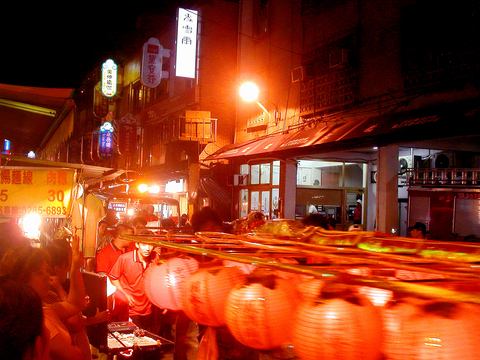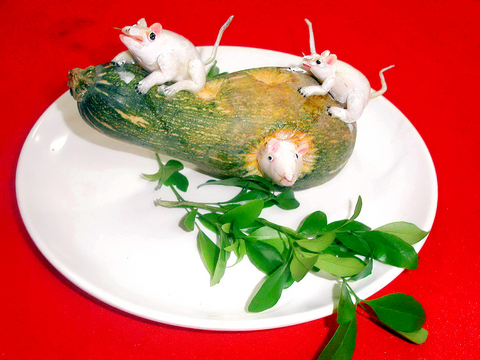People who attend the Mid-Summer Ghost Festival at Lujhou (
The reason for it is very simple, said Yang Lien-fu (
"There are so many good religious traditions that are on the verge of extinction," he said. "As the second generation of the temple's management, I feel obliged to carry forward old traditions and keep them alive as long as possible."

PHOTO COURTESY YONGLIAN TEMPLE
The temple took over the city's public sacrificial rites for the Mid-Summer Ghost Festival about four years ago. It now has one of the nation's most elaborate Ghost Festival religious ceremonies, after that of Keelung City.
Built in 1873, Yonglian Temple is the center for Buddhist worship in Lujhou. It has gone through various renovations and expansion projects over the years, with the latest renovation work being completed in 1997.
Festival roots

PHOTO COURTESY YONGLIAN TEMPLE
The festival, which makes offerings on the 15th day of the seventh lunar month, is a custom dating back thousands of years.
According to Buddhist beliefs, the festival originates from a story about Moginlin, a disciple of the Buddha Sakyamuni. He went to hell to rescue his mother, who was being punished for selfishness and failing to do good deeds when she was alive.
The Buddha told him that if he wished to relieve his mother from her suffering, he should offer five fruits and 100 delicacies to all ghosts on the 15th day of the seventh lunar month.
Taoists, meanwhile, believe that the festival is held to mark the birthday of the Guardian of Hell, who governs all matters in the underworld. He decreed an amnesty so all lost souls in hell could be released to return to the mortal world on the first day of the seventh lunar month. They enjoy incense, candles and food offered to them for one month so that they might be converted to "the Way."
In current practice, the Mid-Summer Ghost Festival begins on the first day of the seventh lunar month and is marked by the opening of the gates of the underworld. All the wandering, hungry and lonely ghosts in hell then return to the world of the living for one month.
On the 14th day, a parade is held and lanterns are released on waterways to light the way for abandoned souls and lead them to dry land.
A ceremonial dance is performed to welcome deity Chung Kwei (
Paste offerings
Nowadays, paste sacrificial figures are distributed to festival goers at the end of the day for home decoration. They are not edible -- although about 20 or 30 years ago they were. In earlier times, paste figures were also offered at house-warming parties or weddings.
According to Hung Shih-hsien (
For the modern version of these figures, food preservatives are added to the dough, which is made of flour, rice powder and water. After the figures are dried, they are painted and then varnished with a plastic coating to prevent them from cracking.
Finished figures made out of the dough can last for as long as a year, said Lee Chun-hsiung (
Paste figures mounted on perishable vegetables such as potatoes, pumpkins or bitter squash, though, last for between three and 10 days. Some figures, such as birds made out of papier-machet, can last for two to three years.
In addition to the paste figures and papier-machet, Lee can also make fish ice sculptures and carve turnip cranes for the event.
It takes Lee about a month to finish around 100 pieces of art for the festival. A blessing by monks then symbolically multiplies the 100 items so that they can feed the countless ghosts who will attend the festival.
Lee's catering business is deteriorating rapidly, however, and paste-sacrifice art is declining in popularity as Lujhou becomes urbanized. Lee said he is planning to venture into a more lucrative business, and will open eateries in Lujhou and Sanchong (
Dying art
During its peak, Lee said his catering business had more than 20 engagements a month, but the number has now dwindled to about 10.
Lee started learning the skills of the business from his father, a professional caterer for weddings, funerals, birthday parties and religious events, at the age of 25. He is 39 now.
His father's exquisite skills in making paste figures earned him an award of excellence at the 1996 Taipei Chinese Culinary Exhibition.
Now, the Lees number among the nation's few masters specializing in the art. The younger Lee says that he knows of one other person who has mastered the art -- a 60-year-old living in Sanchong.
Pig sacrifices
About 10km away from the Yonglian Temple, a different type of religious tradition is taking place. The Ghost Festival had attracted about a dozen pig farmers carrying truckloads of sacrificial pigs to the Tachong Temple in Pali (
The 210-year-old Tachong Temple has just been designated as having historically significant architecture, and temple managers hope to begin a renovation project by the end of next month to give the building a face-lift.
Chou Chin-tiao (周金條) won this year's pig-raising contest with an animal that weighed 890kg. The first runner-up came in far behind, at under 500kg, with the second runner-up weighing about 400kg.
This was the fifth time Chou won the contest. The secret of growing such a big pig, Chou said, lies in the fodder. The feed he uses contains grain shells, rice porridge, canned fish, pig oil, milk powder and raw oysters.
The animal is fed twice a day, with 14kg of fodder each meal, and is given water every three hours. The cost for the fodder alone is about NT$30,000 a month.
During the summer, he has seven fans blowing on the animal to keep it cool and comfortable.
During his some 30 years of pig farming, Chou said that only three pigs died under his care. Although he spends more time and effort taking care of the animals than his wife and four children, Chou said that it pays off when he wins the highest honor.
"I don't raise the pigs for the gold plate or certificate of merit," he said. "I do it to fulfill a promise I made to the Buddha when I was poor that I would offer big sacrifices if I could have food to eat and clothes to wear."

A preclearance service to facilitate entry for people traveling to select airports in Japan would be available from Thursday next week to Feb. 25 at Taiwan Taoyuan International Airport, Taoyuan International Airport Corp (TIAC) said on Tuesday. The service was first made available to Taiwanese travelers throughout the winter vacation of 2024 and during the Lunar New Year holiday. In addition to flights to the Japanese cities of Hakodate, Asahikawa, Akita, Sendai, Niigata, Okayama, Takamatsu, Kumamoto and Kagoshima, the service would be available to travelers to Kobe and Oita. The service can be accessed by passengers of 15 flight routes operated by

GIVE AND TAKE: Blood demand continues to rise each year, while fewer young donors are available due to the nation’s falling birthrate, a doctor said Blood donors can redeem points earned from donations to obtain limited edition Formosan black bear travel mugs, the Kaohsiung Blood Center said yesterday, as it announced a goal of stocking 20,000 units of blood prior to the Lunar New Year. The last month of the lunar year is National Blood Donation Month, when local centers seek to stockpile blood for use during the Lunar New Year holiday. The blood demand in southern Taiwan — including Tainan and Kaohsiung, as well as Chiayi, Pingtung, Penghu and Taitung counties — is about 2,000 units per day, the center said. The donation campaign aims to boost

ENHANCING EFFICIENCY: The apron can accommodate 16 airplanes overnight at Taoyuan airport while work on the third runway continues, the transport minister said A new temporary overnight parking apron at Taiwan Taoyuan International Airport is to start operating on Friday next week to boost operational efficiency while the third runway is being constructed, the Ministry of Transportation and Communications said yesterday. The apron — one of the crucial projects in the construction of the third runway — can accommodate 16 aircraft overnight at the nation’s largest international airport, Minister of Transportation and Communications Chen Shih-kai (陳世凱) told reporters while inspecting the new facility yesterday morning. Aside from providing the airport operator with greater flexibility in aircraft parking during the third runway construction,

American climber Alex Honnold is to attempt a free climb of Taipei 101 today at 9am, with traffic closures around the skyscraper. To accommodate the climb attempt and filming, the Taipei Department of Transportation said traffic controls would be enforced around the Taipei 101 area. If weather conditions delay the climb, the restrictions would be pushed back to tomorrow. Traffic controls would be in place today from 7am to 11am around the Taipei 101 area, the department said. Songzhi Road would be fully closed in both directions between Songlian Road and Xinyi Road Sec 5, it said, adding that bidirectional traffic controls would